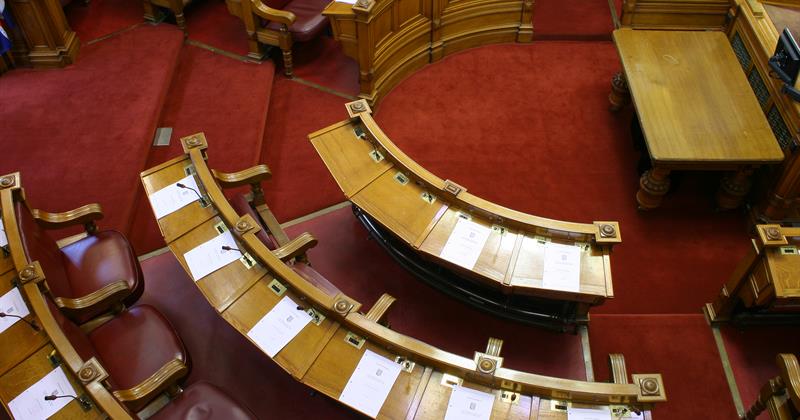This Week’s States Meeting - Tuesday 27 February

26th February 2024
Tomorrow, Tuesday 27 February, the next meeting of the States Assembly will commence at 9:30am. The meeting takes place in the States Chamber and is open for the public to attend, as well as being broadcast live via Public-I and on the States Assembly YouTube channel.
Appointments
Minister for Education and Lifelong Learning: Following the Chief Minister's changes to the Ministerial Office for the Minister for Children and Education, separating the Ministerial Office into two Ministerial Offices*, the States Assembly will begin by appointing a Minister for Education and Lifelong learning. The Minister for Children will continue to be Connétable Richard Vibert, following his election to the role on 30 January 2024.
The Chief Minister, Deputy Lyndon Farnham, will nominate Deputy Rob Ward as Minister for Education and Lifelong Learning, which is a new Ministerial position. Other nominations for this post will be invited from across the Assembly.
Every candidate is expected to make a speech for up to 10 minutes, and then answer a maximum of 20 minutes of questions, even if there is only one person nominated. If there is more than one nomination, the other candidates must withdraw from the Chamber during the other nominees' speech and question time. There will then be a recorded vote for the Assembly's preferred candidate.
If no other candidates are put forward by the Assembly, after his speech and question time, Deputy Rob Ward will be appointed to the role.
President of the Scrutiny Liaison Committee (SLC). SLC brings together the Chairs of the five standing Scrutiny Panels, alongside the Chair of the Public Accounts Committee (PAC). Following appointment to these roles on 6 February, the Chairs may put themselves forward for the role of President of SLC.
Each candidate is expected to make a speech for up to 10 minutes, and then answer a maximum of 20 minutes of questions. If there is more than one nomination, the other candidates must withdraw from the Chamber during the other nominees' speech and question time.
A recorded vote will be held until one candidate receives an overall majority of the votes cast. The electronic voting system will be used in any instance where there are no more than two candidates; an open ballot will take place in instances where there are more than two candidates. If there is only one candidate nominated for this role, they will be appointed.
Privileges and Procedures Committee (PPC) Members. PPC is responsible for the procedures of the States Assembly, for Members' facilities and the Code of Conduct for Elected Members. States Members will elect new members to the PPC in a secret ballot.
Public Accounts Committee (PAC) Members. The PAC assesses whether public funds have been applied for the purpose intended by the States and whether sound financial practices are being applied throughout the public sector. States Members will elect new members to the PAC in a secret ballot.
Scrutiny Panel Members. Scrutiny panels carry out detailed investigations into Ministers' work and can call for papers and witnesses relevant to their investigations. Members will be elected to Corporate Services, Economic and International Affairs, Environment, Housing and Infrastructure and Health and Social Security Scrutiny Panels (in this order). States Members will elect new members to the Scrutiny panels in a secret ballot.
Planning Committee Members. The Planning Committee considers planning applications and grants or refuses planning permission. The committee meets in public and hears the views of objectors and others before making its decisions. States Members will elect new members to the Planning Committee in a secret ballot.
British-Irish Parliamentary Assembly Associate Member (BIPA). The objective of BIPA is to contribute to a mutual understanding between Britain and Ireland through its work and through informal contacts. States Members will elect the new BIPA Associate Member in a secret ballot.
Oral Questions
States Members will question Ministers for up to 2 hours and 20 minutes. These oral questions will have been issued to Ministers in advance (i.e. 'with notice'). Details of this week's oral questions with notice can be found on page 5 of the Order Paper.
The following Ministers will then answer oral questions which they have not been given in advance of the meeting (i.e., 'without notice') for 15 minutes each:
- Minister for Justice and Home Affairs, Deputy Mary Le Hegarat
- Minister for International Development, Deputy Carolyn Labey
- Chief Minister, Deputy Lyndon Farnham
Public Business
The States Assembly will then begin debating the following topics:
Topics: | More information: |
Ceasefire in Gaza
| Deputy Montfort Tadier's proposition Minister for External Relations' amendment |
Jersey Overseas Aid Commission: Re-Appointment of a Commissioner | Minister for International Development's proposition |
Cabinet Office Expenditure Savings
| Deputy Max Andrews' proposition |
A notification when each debate begins, a summary of the proposal and the results of each debate will be shared on the States Assembly X page (formerly Twitter) throughout the meeting. A summary of the meeting will be shared at the end of each day on the news section of the States Assembly website.
*Further information on the split of responsibilities between the Minister for Children and Families and the Minister for Education on Lifelong Learning:
Minister for Children and Families | Minister for Education and Lifelong Learning |
Children's Social Care | Education
|
Integrated Services | Library Service |
Young People Services
| Skills |
Chief Officer Directorate
| |
![]()
Back to news